
The longhorn beetles (Cerambycidae), also known as long-horned or longicorns, are a large family of beetles, with over 35,000 species described.
The Taveuni beetle is known from the island of Taveuni in the Fiji, and is one of the largest living insect species, with specimens around 14 cm long, excluding legs, antennae, or mandibles.

Macrodontia is an American genus of long-horned beetles remarkable for their large size and for the large mandibles of the males in particular.

Cerambyx cerdo, commonly known as the great capricorn beetle or cerambyx longicorn, is a species of beetle in family Cerambycidae. It occurs in North Africa, Europe, and Asia.

Xylotoles costatus, the Pitt Island longhorn beetle, is a species of beetle in the family Cerambycidae. It is endemic to the Chatham Islands. Once thought to be extinct, it is now known to survive on South East Island/Rangatira; being therefore an example of a so-called "Lazarus taxon".
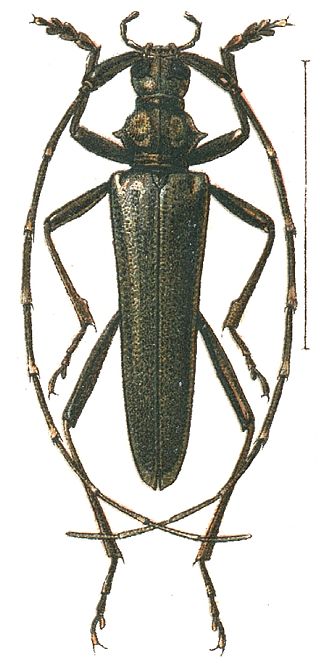
The Disteniidae are a small family of beetles in the superfamily Chrysomeloidea, traditionally treated as a group within the Cerambycidae.

The Trictenotomidae are a small family of beetles in the superfamily Tenebrionoidea, containing fifteen species in two genera. Most species are found in the Oriental realm where they live in montane forest habitats. The family is considered, based on larval characters as well as sequence-based studies, to be closely related to the Salpingidae.

Stictoleptura rubra, the red-brown longhorn beetle, is a species of beetles belonging to the family Cerambycidae.

Agapanthia cardui is a species of flat-faced longhorn beetle belonging to the family Cerambycidae, subfamily Lamiinae.

Pseudovadonia livida, the fairy-ring longhorn beetle, is a beetle species of flower longhorns belonging to the family Cerambycidae, subfamily Lepturinae.

Enoplocerus is a genus of longhorn beetles in the subfamily Prioninae of the family Cerambycidae. It is monotypic, being represented by the single species Enoplocerus armillatus, commonly known as the giant longhorn beetle or imperious sawyer.
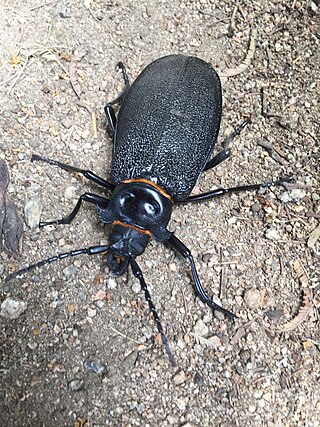
Acanthinodera is a genus of longhorned beetles in the family Cerambycidae. It is monotypic, being represented by the single species Acanthinodera cumingii. It is the largest species of beetle in Chile. The beetle is endemic to central Chile and can be found from IV Coquimbo Region to IX La Araucanía Region.
Scapanopygus cinereus is a species of beetle in the family Cerambycidae, the only species in the genus Scapanopygus. Both the genus and species were described in 1913 by French entomologist Pierre-Émile Gounelle. The type specimen was collected from Averías, a municipality in Argentina, on the banks of the Salado River.
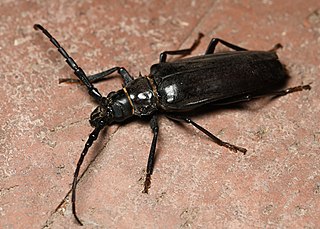
Derobrachus hovorei is a species of beetle in the family Cerambycidae, known variously as the palo verde beetle, palo verde root borer, or palo verde borer beetle. For over 100 years, this species was confused with the related species Derobrachus geminatus, and only recognized and given its own name by Santos-Silva in 2007; essentially all literature prior to 2007 therefore incorrectly uses the name geminatus for this species. It is a longhorn beetle native to the southwestern United States and northern Mexico which derives its common name from the palo verde tree, and it is one of the largest beetles in North America, reaching up to three and a half inches in length. Adults are black or brown in colour, have long antennae, and spines on the thorax. They have wings and can fly, albeit awkwardly at times. Mature beetles emerge in the summer to mate. While not harmful to humans, they can bite in self-defense.
Adalbus crassicornis is a species of longhorn beetle in the Cerambycinae subfamily, and the only species in the genus Adalbus. It was described by Fairmaire and Germain in 1859. It is known from Chile and western Argentina. Its host plants are Nothofagus pumilio, Nothofagus dombeyi, Nothofagus antarctica, and Nothofagus alpina. Specimens have been collected in regions where the Chilean pine grows, including Cordillera de Nahuelbuta, Cherquenco, and Caramávida.
Chlorida inexpectata is a species of beetle in the family Cerambycidae. It was described by Ubirajara Martins, Maria Helena Galileo and Francisco Limeira-De-Oliveira in 2011. The species epithet is derived from the Latin inexpectatus. It is known from Brazil.
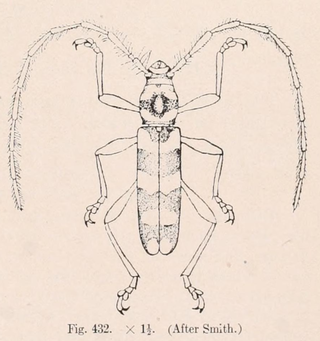
Dryobius sexnotatus is a species of beetle in the family Cerambycidae. It is the only species in the monospecific genus Dryobius.

Cervoglenea lata is a species of beetle in the family Cerambycidae, and the only species in the genus Cervoglenea. It was described as ? Glenea lata by J.L. Gressitt in 1935, from a specimen taken in Taiwan. He later placed it in a separate genus Cervoglenea.

Callipyrga turrita is a species of beetle in the family Cerambycidae, and the only species in the genus Callipyrga. It was described by Edward Newman in 1842 using a specimen obtained by Rupert Kirk at Woodside near Sydney. This species is endemic to coastal eastern Australia from Townsville in Queensland down to Glenmore in New South Wales. The adult beetles are attracted to light and have been collected on Geijera parviflora and Flindersia xanthoxyla.
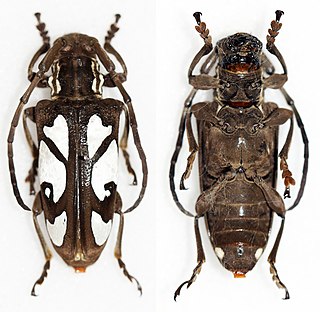
Calothyrza margaritifera is a species of beetle in the family Cerambycidae. It was described by John O. Westwood in 1848 in his "The Cabinet of Oriental Entomology" as Phryneta margaritifera.















